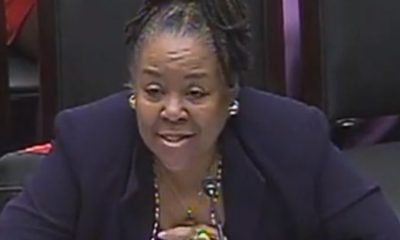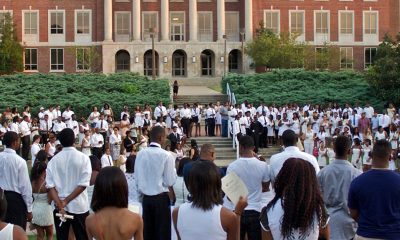Activism
OPINION: How to Have a Happy New Year in 2024
Just before the Christmas holiday, Donald Trump was on the campaign trail in Iowa denouncing immigrants. “They’re ruining our country. And it’s true, they are destroying the blood of our country,” he said. Trump, the phlebotomist, was talking about the southern border, but the arrivals aren’t just from Mexico, or Central and South America. Increasingly, the border crossers have been Asian, particularly from China and India. He’s talking about all of us “others.”

By Emil Guillermo
This holiday season, I extend to you the gift of history.
But, first, consider the stark contrast in the recent immigration-speak between the two candidates who will more than likely be contesting for the U.S presidency in 2024: President Joseph R. Biden and former President Donald J. Trump.
There’s Biden. Then, there’s that other guy, the twice impeached, quadruple-indicted, former president who seems intent on driving the U.S. into full-speed reverse mode.
That would be the desire of Donald Trump, who as Liz Cheney says, has America sleepwalking into dictatorship.
Don’t think it can’t happen. Seventy percent of Republicans say, despite Trump’s criminality, they would rather see him return to the White House, according to a recent New York Times/Sienna College poll.
Good for them, bad for America.
There’s still enough time to reverse the reversal before Trump actually debases American democracy.
TRUMP’S VIEW ON IMMIGRANTS
Just before the Christmas holiday, Donald Trump was on the campaign trail in Iowa, denouncing immigrants. “They’re ruining our country. And it’s true, they are destroying the blood of our country,” he said.
Trump, the phlebotomist, was talking about the southern border, but the arrivals aren’t just from Mexico, or Central and South America. Increasingly, the border crossers have been Asian, particularly from China and India.
He’s talking about all of us “others.”
Compare Trump’s hate speech with the public statement Biden made on Dec. 17.
That day, President Biden honored Chinese immigrants by remembering the 80th anniversary of the repeal of the Chinese Exclusion Act.
The Chinese Exclusion Act was the first and only major law that barred a specific national group from immigrating to the U.S.
Even when the Exclusion Act was repealed in 1943, some restrictions remained. Chinese may not have faced wholesale exclusion, but Chinese immigration was limited to just over 100 people a year. The racist quota was in place until the Hart-Cellar Act gave the U.S. the immigration reform needed in 1965.
“The Act, along with racism and xenophobia in other parts of American life, was part of the anti-Chinese “Driving Out” era which included the Rock Springs and Hells Canyon Massacre,” Biden added.
In Rock Springs, Wyoming, in 1882, at least 28 Chinese miners were killed and 15 injured by angry White miners who feared the Chinese were taking their jobs. Rioters then went on to burn down 80 homes in Rock Springs’ Chinatown.
Five years later in 1887, Oregon’s Hells Canyon Massacre, also known as the Snake River Massacre, saw 30 Chinese laborers gunned down by a gang of White horse thieves.
No one was ever held to account.
President Biden cared enough about that history when he remembered the anniversary of the Chinese Exclusion Act.
“Today, there are those who still demonize immigrants and fan the flames of intolerance,” Biden said in his statement. “It’s wrong. I ran for President to restore the soul of America. To bring people together and make sure we give hate no safe harbor.”
You want a Happy New Year? Let’s put the present in an historical context and keep moving forward, with undeniable clarity — together.
About the Author
Emil Guillermo is a journalist and commentator. He does a micro-talk show on YouTube.
Activism
Oakland Post: Week of April 24 – 30, 2024
The printed Weekly Edition of the Oakland Post: Week of April 24 – 30, 2024

To enlarge your view of this issue, use the slider, magnifying glass icon or full page icon in the lower right corner of the browser window. ![]()
Activism
Oakland Post: Week of April 17 – 23, 2024
The printed Weekly Edition of the Oakland Post: Week of April 17 – 23, 2024

To enlarge your view of this issue, use the slider, magnifying glass icon or full page icon in the lower right corner of the browser window. ![]()
Activism
Oakland Schools Honor Fred Korematsu Day of Civil Liberties
Every Jan. 30, OUSD commemorates the legacy of Fred Korematsu, an Oakland native, a Castlemont High School graduate, and a national symbol of resistance, resilience, and justice. His defiant stand against racial injustice and his unwavering commitment to civil rights continue to inspire the local community and the nation. Tuesday was “Fred Korematsu Day of Civil Liberties and the Constitution” in the state of California and a growing number of states across the country.

By Post Staff
Every Jan. 30, OUSD commemorates the legacy of Fred Korematsu, an Oakland native, a Castlemont High School graduate, and a national symbol of resistance, resilience, and justice.
His defiant stand against racial injustice and his unwavering commitment to civil rights continue to inspire the local community and the nation. Tuesday was “Fred Korematsu Day of Civil Liberties and the Constitution” in the state of California and a growing number of states across the country.
One OUSD school is named in his honor: Fred T. Korematsu Discovery Academy (KDA) elementary in East Oakland.
Several years ago, founding KDA Principal Charles Wilson, in a video interview with anti-hate organization “Not In Our Town,” said, “We chose the name Fred Korematsu because we really felt like the attributes that he showed in his work are things that the children need to learn … that common people can stand up and make differences in a large number of people’s lives.”
Fred Korematsu was born in Oakland on Jan. 30, 1919. His parents ran a floral nursery business, and his upbringing in Oakland shaped his worldview. His belief in the importance of standing up for your rights and the rights of others, regardless of race or background, was the foundation for his activism against racial prejudice and for the rights of Japanese Americans during World War II.
At the start of the war, Korematsu was turned away from enlisting in the National Guard and the Coast Guard because of his race. He trained as a welder, working at the docks in Oakland, but was fired after the bombing of Pearl Harbor in 1941. Fear and prejudice led to federal Executive Order 9066, which forced more than 120,000 Japanese Americans out of their homes and neighborhoods and into remote internment camps.
The 23-year-old Korematsu resisted the order. He underwent cosmetic surgery and assumed a false identity, choosing freedom over unjust imprisonment. His later arrest and conviction sparked a legal battle that would challenge the foundation of civil liberties in America.
Korematsu’s fight culminated in the Supreme Court’s initial ruling against him in 1944. He spent years in a Utah internment camp with his family, followed by time living in Salt Lake City where he was dogged by racism.
In 1976, President Gerald Ford overturned Executive Order 9066. Seven years later, the 9th Circuit Court of Appeals in San Francisco vacated Korematsu’s conviction. He said in court, “I would like to see the government admit that they were wrong and do something about it so this will never happen again to any American citizen of any race, creed, or color.”
Korematsu’s dedication and determination established him as a national icon of civil rights and social justice. He advocated for justice with Rosa Parks. In 1998, President Bill Clinton gave him the Presidential Medal of Freedom saying, “In the long history of our country’s constant search for justice, some names of ordinary citizens stand for millions of souls … To that distinguished list, today we add the name of Fred Korematsu.”
After Sept. 11, 2001, Korematsu spoke out against hatred and discrimination, saying what happened to Japanese Americans should not happen to people of Middle Eastern descent.
Korematsu’s roots in Oakland and his education in OUSD are a source of great pride for the city, according to the school district. His most famous quote, which is on the Korematsu elementary school mural, is as relevant now as ever, “If you have the feeling that something is wrong, don’t be afraid to speak up.”
-

 Activism4 weeks ago
Activism4 weeks agoOakland Post: Week of March 27 – April 2, 2024
-

 #NNPA BlackPress4 weeks ago
#NNPA BlackPress4 weeks agoBeloved Actor and Activist Louis Cameron Gossett Jr. Dies at 87
-

 Community2 weeks ago
Community2 weeks agoFinancial Assistance Bill for Descendants of Enslaved Persons to Help Them Purchase, Own, or Maintain a Home
-

 Activism3 weeks ago
Activism3 weeks agoOakland Post: Week of April 3 – 6, 2024
-

 Business2 weeks ago
Business2 weeks agoV.P. Kamala Harris: Americans With Criminal Records Will Soon Be Eligible for SBA Loans
-

 Activism2 weeks ago
Activism2 weeks agoOakland Post: Week of April 10 – 16, 2024
-

 Community2 weeks ago
Community2 weeks agoAG Bonta Says Oakland School Leaders Should Comply with State Laws to Avoid ‘Disparate Harm’ When Closing or Merging Schools
-

 Community1 week ago
Community1 week agoOakland WNBA Player to be Inducted Into Hall of Fame
























































